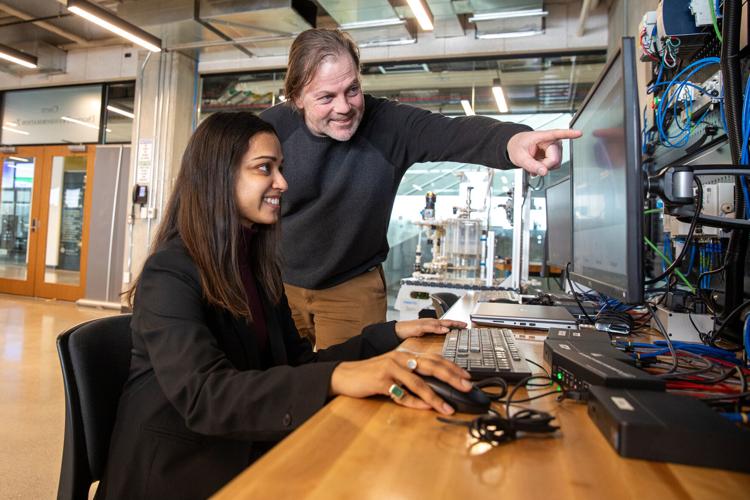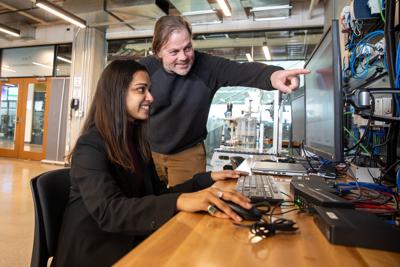As the impact of AI shifts the landscape of a growing number of industries, educators are looking at ways to integrate and harness its power.
âWe need to think strategically and nimbly about how AI is evolving and how to make sure those skill sets are embedded in our programs,â said Vera Beletzan, associate vice-president of Teaching and Learning at Humber Polytechnic, one of the top research post-secondary schools in the GTA. âWe have the momentum, expertise and are laser-focused on industry and employability.â
Central to Humberâs new vision is future-proofing students by ensuring they graduate with the AI skills, adaptability and experience they need to thrive in a rapidly evolving workforce.
âProductivity is the engine of economic growth, and it has been in decline in Canada for many years,â said Dr. Ann Marie Vaughan, president and CEO. âThe country has struggled to effectively convert innovation into commercial success. We are going to change that.â
By bridging academia, industry and government in all levels of programming, Humber aims to ensure success for the schoolâs more than 80,000 learners.
Humber is continuously researching and developing courses which focus on honing practical skills and knowledge that meet industry demands.
To create the best learning pathways, staff design a diverse mix of credentialsâincluding certificates, degrees, and, most recently, applied master’s programsâwhile collaborating with industry partners to identify opportunities for new programs.
Launched almost two years ago, is a two-semester certificate offered to students with experience in computer programming, software development or computer science. In addition to developing models and software for AI, the program prepares students for roles in machine learning, data analytics and AI design.

For those without prior tech education, the new will be available to postgraduate students from a broad range of studies, such as business, media, health, economics, design and data analysis.
The two-semester program, which starts in May, will introduce grad students to the fundamentals of artificial intelligence, emphasizing no-code and low-code platforms and applicable tools, with a focus on regulations, policy and ethics in applying AI technology.
Key content includes project management, tool usage and integration, regulations and legislation, misinformation policies, deepfake, synthetic data, ethical implications and cybercrime. Like AI with Machine-Learning, the program ends with an industry-supervised capstone project.Â
AI professor Parisa Pouladzadeh said the new program is open for everyone, including managers, to gain insight into decision-making in their jobs.
âSome people are worried about losing their jobs,â she said. âWe are not losing jobs, we are just transforming the way we are workingââ in fact, creating new roles along the way, like AI trainers, auditors, ethics specialists, art directors or application developers.
âStudents will follow their career paths but with new knowledge of AI,â she added. âThey will take the benefits of AI to their jobs.â
Transforming a system which has been âlargely unchanged for a long timeâ requires creating robust support for students and staff alike, said Beletzan.
âTeachers will have AI to help plan new activities, projects and give feedback,â she explained, âIt will help reduce some of the more repetitive tasks and free teachers up to be more creative.â
Humber has developed guidelines for how to use AI in teaching, navigate issues around academic integrity and embed AI learning as part of how and what they teach.
For the past year, staff have been working on a set of 12 employability skills profiles, including digital fluency, to develop a competency framework for Humberâs administrative and support staff and faculty members.
From the outset, equipping students with the skills they need for success also means creating a mindset for lifelong learning and building out strategies for micro-credentials to encourage upskilling.
âSelf-assessment is a vital skill,â said Beletzan. âNow more than ever, itâs going to be important for young people to be lifelong learners.
âWe can teach them based on what we know today, but they should be prepared for constant change and know how to access that learning as they need it throughout their professional careers.â
Humber President, Dr. Vaughan, said the schoolâs deep industry connections also allows the institution to see potential jobs that are âyet to be fully realized.â
âWe are not just responding to change; we are anticipating it,â she said. âBy integrating AI into our programs, we are equipping students with future-proof skills that will set them apart in the job market.â                                              Â




























